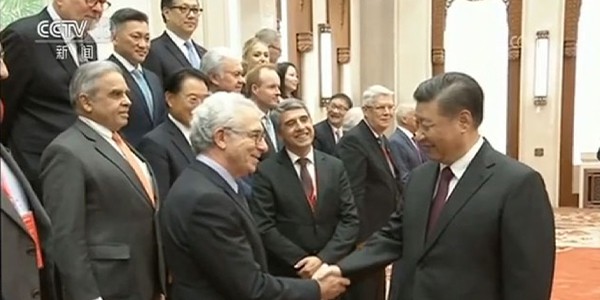Nathan Gardels is the editor-in-chief of Noema Magazine. He is also the co-founder of and a senior adviser to the Berggruen Institute.
GUANGZHOU, China — This week, the Berggruen Institute’s 21st Century Council met with Chinese President Xi Jinping in Beijing and then gathered in this city-region of 22 million inhabitants for the fourth “Understanding China” conference. The theme this time was China’s plans for the next phase of “reform and opening up” and what the Chinese leader calls “the new globalization.”
In his opening remarks, Xi framed the discussion. “You can’t understand China,” he said, “unless you understand its path to development, which is linked to globalization. China will never close its opening to the world.”
Zhu Min, a former deputy managing director of the International Monetary Fund, laid out China’s reading of where things are headed amid the trade turmoil with the U.S. He noted that the 25 percent tariffs across around 90 percent of China’s exports to America are at a level unprecedented even in the 1930s.
Yet, the U.S. trade deficit has nonetheless increased while China’s trade volume has further expanded. China’s exports, Zhu reported, have actually risen as “trade is redistributed” to Mexico, Canada, Vietnam and Europe. China’s economy is still growing at more than 6 percent — less than the double-digit growth of the early days of “reform and opening up,” but across an economy that is several times larger. And that growth, his analysis shows, is a result of the recomposition of the economy in which consumption accounts for more than half of GDP, while services are growing and manufacturing shrinking.
However, Zhu warned, the trade war has had a greater negative impact on global growth because of the uncertainties that abound. Since companies cannot plan ahead with confidence and organize reliable supply chains with any certainty, investment has stalled. Falling investment, he emphasized, has always been a leading indicator of a coming global recession.
Ernesto Zedillo, the 21st Century Council president and former president of Mexico, came out swinging at America’s unilateral imposition of tariffs, calling them illegal under World Trade Organization rules. He urged Europe and the rest of the WTO members to band together to press for their removal and punish the U.S. Otherwise, we will return to “the law of the jungle” in which the most powerful nations pursue advantages over all others instead of a “rules-based system” that’s fair for all.
Zhu acknowledged that there was no turning back to the previous tone and tenor of U.S.-China relations after the “Trump bump,” not least because the leading Democratic contenders for the American presidency harbor many of the same anti-China sentiments as the current administration. We are headed, he said, into a paradigm shift — a “new normal” — that will be very different from the past three decades.
In my remarks, I argued that this new normal would be characterized by a protracted “duality” in relations in which conflict and cooperation will coexist. Though there is likely to be some deal in the coming weeks or months over conventional trade in commodities like soybeans, the most consequential issue — the race for technological dominance — will not be resolved anytime soon, if ever.
The central project of modern China, and in particular Xi’s “national rejuvenation,” is to never again fall behind the West in technological achievement, as it did in the 19th and early 20th centuries, which invited imperial domination. Yet, today’s information technology, especially artificial intelligence, is not just another factor of production like machine tools. It is about the use of data and the control of information and free expression. Though the West is itself engaged in an internal debate over privacy and surveillance capitalism, there is nonetheless a sharp political and cultural divergence over core values between East and West.
At the same time, accelerating climate change demands common urgent action that will have to be taken up by “networks of the willing” even though the U.S. has formally withdrawn from the Paris climate accord.
Conflict is therefore as inexorable as cooperation is imperative.
What this entails in practice is a “partnership of rivals” around the convergent interest of climate action even as relations deteriorate in other realms. Cooperation on climate cannot mean that the West should remain silent on Beijing’s erosion of autonomy in Hong Kong or on the “reeducation camps” for Muslim Uighurs. The West must call China out on those issues, but by taking a stand, not taking sides. We should criticize, not demonize, China.




